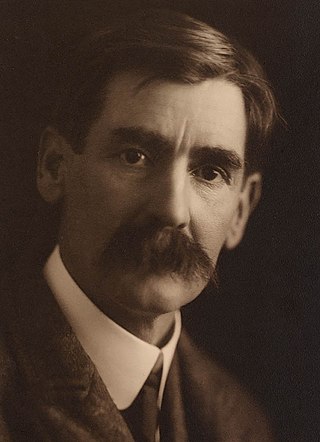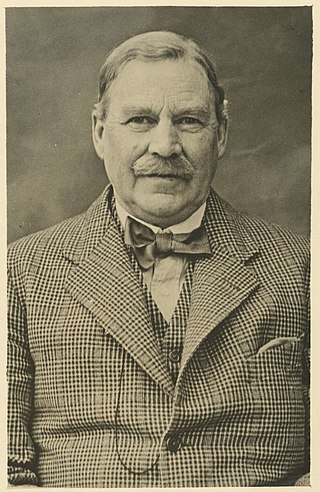
Andrew Barton "Banjo" Paterson, was an Australian bush poet, journalist and author, widely considered one of the greatest writers of Australia's colonial period.

Henry Archibald Hertzberg Lawson was an Australian writer and bush poet. Along with his contemporary Banjo Paterson, Lawson is among the best-known Australian poets and fiction writers of the colonial period and is often called Australia's "greatest short story writer".

William Henry Ogilvie was a Scottish-Australian narrative poet and horseman, jackaroo, and drover, and described as a quiet-spoken handsome Scot of medium height, with a fair moustache and red complexion. He was also known as Will Ogilvie, by the pen names including 'Glenrowan' and the lesser 'Swingle-Bar', and by his initials, WHO.

Victor James William Patrick Daley was an Australian poet. Daley serves chiefly as an example of the Celtic Twilight in Australian verse. He also serves as a lyrical alternative to his contemporary bush balladists of Henry Lawson, Banjo Paterson, and Will H. Ogilvie.

Dame Mary Jean Gilmore was an Australian writer and journalist known for her prolific contributions to Australian literature and the broader national discourse. She wrote both prose and poetry.

Edward George Dyson was an Australian journalist, poet, playwright and short story writer. He was the elder brother of illustrators Will Dyson (1880–1938) and Ambrose Dyson (1876–1913), with three sisters also of artistic and literary praise.
"Saint Peter" is a well-known poem by iconic Australian writer and poet Henry Lawson. It was first published on 8 April 1893 in The Bulletin.
"Up The Country" is a popular poem by iconic Australian writer and poet Henry Lawson. It was first published in The Bulletin magazine on 9 July 1892, under the title "Borderland." Its publication marked the start of the Bulletin Debate, a series of poems by both Lawson and Andrew Barton "Banjo" Paterson asserting contrasting views of the true nature of life in the Australian bush.
In Defence of the Bush is a popular poem by Australian writer and poet Andrew Barton "Banjo" Paterson. It was first published in The Bulletin magazine on 23 July 1892 in reply to fellow poet Henry Lawson's poem, Up The Country. Paterson's rebuttal sparked the Bulletin Debate, a series of poems by both Lawson and Paterson about the true nature of life in the Australian bush.
The City Bushman is a poem by iconic Australian writer and poet Henry Lawson. It was first published in The Bulletin magazine on 6 August 1892, under the title In Answer to "Banjo", and Otherwise. It was the fourth work in the Bulletin Debate, a series of poems by both Lawson and Andrew Barton "Banjo" Paterson, and others, about the true nature of life in the Australian bush.

Will Lawson, born in Durham, England, was a popular bush poet, novelist, journalist and historian of Australia. Many of his works had sailing or stage coach themes.
The Poets of the Tomb is a poem by Australian writer and poet Henry Lawson. It was first published in The Bulletin magazine on 8 October 1892 in reply to fellow poet Andrew Barton "Banjo" Paterson's poem, In Answer to Various Bards.

The Teams is a poem by Australian writer and poet Henry Lawson. It was first published in the Australian Town and Country Journal on 21 December 1889. It was later published in the poet's poetry collection In the Days When the World Was Wide and Other Verses in 1896.
"The Never-Never Country" (1901) is a poem by Australian poet Henry Lawson. It is also known by the title "The Never-Never Land".
"Faces in the Street" (1888) is a poem by Australian poet Henry Lawson.
"The Song of Old Joe Swallow" (1890) is a poem by Australian poet Henry Lawson.
"How M'Dougal Topped The Score" (1898) is a poem by Australian poet Thos. E. Spencer.
"The Fire at Ross's Farm" (1890) is a poem by Australian poet Henry Lawson.
"The Roaring Days" (1889) is a poem by Australian poet Henry Lawson.
"His Father's Mate" is a melodramatic short story by Henry Lawson. It was first published in the 22 December 1888 issue of The Bulletin, and later included in the author's short story collection, While the Billy Boils, and in many short story anthologies. It was the author's first published short story.







